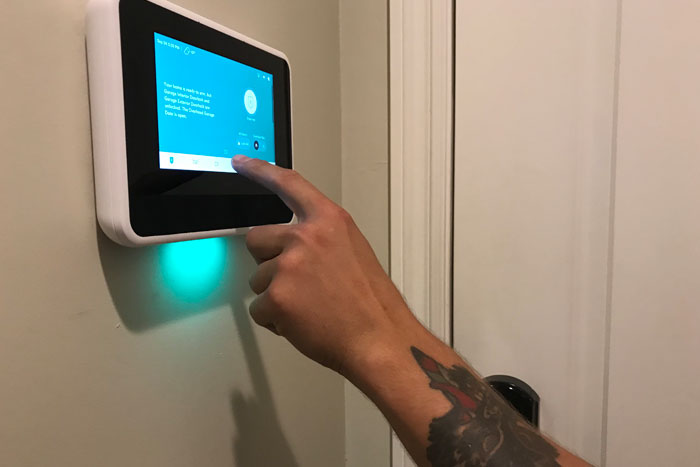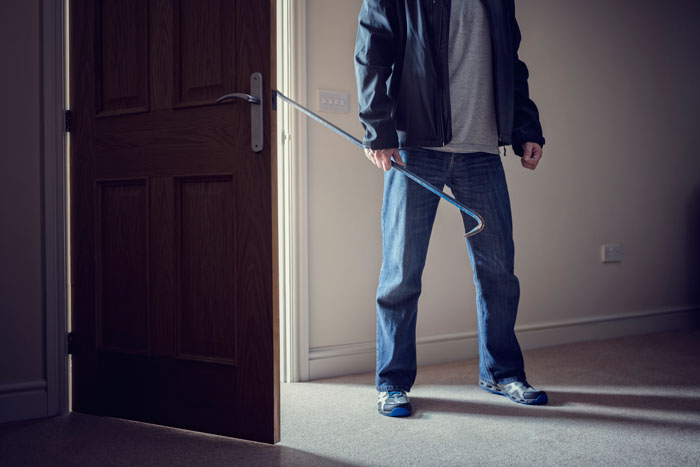
How to Protect Yourself from a Break-In in California
The first thing you need to do is make sure you’re in the habit of really locking up your home, both while you’re away and while in residence. This doesn’t just mean bolting the front door. Go through your house and make sure all the doors that lead to the exterior are locked. Next, do the same with your windows. This is also an excellent opportunity to check the quality of your locks. Make sure that they are in good repair and that they actually keep the door and window locked.
Don’t Be Ostentatious
Don’t make your home look like an appealing risk to robbers. This means you shouldn’t leave your expensive toys lying in the driveway. You also shouldn’t brag about all the valuables you have in your home. Living a quiet life and keeping all of your treasures tucked away might not seem like fun, but it will keep you and your personal property safe.
Be Smart with Your Spare Key
The best thing you can do to keep your home safe is to fit your door with a keypad and routinely change the code, but if you still use a key to open your doors, don’t leave a spare key tucked in a flowerpot or under your welcome mat. In fact, don’t leave the key anywhere outside where it could be found by a would-be thief. Keep your key on your person or tucked in a safe place in your car.
Burglar Proof Your Front Yard
Burglars are attracted to homes that provide a great deal of natural coverage or places where they can hide whenever someone drives past. Removing hedges, shrubs, sheds, and trees that are near your home will deter them. You should also set up a few motion-activated spotlights, yes, any passing wildlife will activate the lights, but they will also cause a burglar to look for a different place to rob.
The best way to make sure your home remains safe, especially while you are away, is to be discreet about what you share on social media. Don’t talk about your vacations and other trips until after you’re home. The last thing you want is to broadcast the fact that your home is unprotected.

What You Need To Know About Property Crimes in California
While the term property crimes gets tossed around by the media, in California, you aren’t going to be charged with a “property crime.” The reason for this is because, in California, the phrase property crime is actually a blanket term that’s used to describe multiple crimes.
The four most common property crimes in California are:
- Arson
- Theft
- Burglary
- Vandalism
If the media says that you have been charged with one or more property crimes, it means you’ve been charged with one or more of these offenses.
Arson is pretty self-explanatory. Arson happens when you deliberately set fire to a property. In California, arson is always a felony. If you’re convicted, you will spend anywhere from 16 months to nine years in prison. One of the big factors that determines how long you’re incarcerated includes if you set fire to your own personal property, if the burned structure was inhabited, and if anyone suffered a serious injury as a result of the fire.
One of the interesting things about arson is that it’s the only property crime you can be charged with, even when the property is your own.
There are multiple types of theft charges in California. For a theft to be considered a property crime, it had to have been committed on someone else’s property. Examples of theft that fall into the category of property crime include:
- Shoplifting
- Grand theft auto
- Robbery
- Embezzlement
- Package theft
Whether your charges are for misdemeanor theft or felony theft depends on the collective value of what was stolen. If the property was less than $900, you’d only face misdemeanor theft charges. If it exceeded $900, you’d be charged with a felony.
Most people not only think of burglary as a property crime but also as a violent crime. To be charged with burglary in California, not only do you have to break into someone’s property (house, barn, shed, storage unit), but you have to do so for the purpose of stealing something. If you’re convicted of second-degree or first-degree burglary in California, you’ll face up to 20 years in a California state prison.
Vandalism, while serious, is often considered the most minor of California’s property crimes. Vandalism is simply the destruction of someone else’s property. To be convicted of vandalism in California, you had to intentionally create the damage and knew the property wasn’t yours. The degree of punishment connected to vandalism in California depends on how much damage was caused. Restitution is often part of the sentence.

Understanding How Bail Works With Absolute Bail Bonds
We understand how bail can be a stressful and confusing situation. Let us reduce your stress as our professional and fully licensed bail bondsmen walk you through the bail bond process, answering all your questions.
The bail bond process is quite simple. Of course, there is going to be its share of legal print, but overall, it’s very understandable.
Question: What is a bail bond for?
Answer: A bail bond is a written promise that the defendant will pay a fixed amount of money for his or her release from jail. The fixed amount will be 10% of the full bail amount.
Question: Does the full fixed amount need to be paid upfront before the defendant can be released?
Answer: No. The bail bond company will calculate a workable payment plan the defendant will be released from jail and following that, payments on the bail bond will continue to be made.
Question: What are the contingencies?
Answer: The defendant is required to show up for all court dates. If the court has additional mandates, like attending counseling, staying away from someone, or someplace, and not leaving the state, for example, the defendant will need to abide by these as well.
Question: What if they don’t?
Answer: The bail bond will be revoked, and the defendant will be taken back into custody. In addition, the full bail amount may need to be paid off.
Question: Is the money refundable at the end of the trial, if my loved one obeyed all his or her orders?
Answer: No. Think of the fixed price for the bail bond as a fee for the bail bond services. But, most people use bail bonds to bail out of jail because, in the long-term view, it is more affordable for them.

What Happens if You Fail to Appear for Jury Duty?
Our justice system depends heavily on jury duty. If you are contacted about jury duty, you’re expected to attend and uphold your civic responsibilities.
First, it is important to understand that even though you have been contacted about jury duty and are expected to serve, there are some exceptions. The court will excuse you for valid health concerns as well as a few other reasons. That doesn’t mean that because you’re in ill health, you don’t have to respond to the summons. You will have to contact the court and discuss how to go about proving your concerns and validating them before you’re excused.
While illness is the most common reason for a person to be excused from jury duty, it’s not the only reason. Other valid reasons include the following:
- You’re a full-time student
- Occupational domain
- You’re connected to the case
- You have a strong, unshakeable opinion about one of the issues surrounding the case
- You have a great deal of advanced knowledge of the case
- You’re elderly (once you’ve passed your 70th birthday, you’re no longer required to serve on a California jury.)
If you aren’t able to be excused from your jury duty summons, you are expected to show up at the courthouse at the appointed time and date. The first time you fail to appear, you’ll receive a postcard from the court giving you a second chance. If you ignore that second postcard, you’ll be charged with contempt of court.
Getting charged with contempt of court for missing jury duty is not a laughing matter. This is a criminal charge. You will have to appear before a judge who will decide how you’re failure to honor your jury duty obligations will be handled. They could order you to spend a few days in jail, do community service, or even fine you up to $1,500.
If, for some reason, you’re unable to honor a jury duty summons in California, you are allowed to postpone your jury duty. This isn’t an indefinite postponement. You’re only allowed to ask for two jury duty postponements during a 12-month period.
When all is said and done, it’s in your best interest to handle the jury summons as soon as you receive it.

What is Sober Living in California? How Does It Work?
When most people hear the term sober living, they assume that it refers to a person who has decided to completely abstain from alcohol and drugs.
The truth is that sober living is actually a program that’s designed to help addicts start the long road to recovery.
Sober living in California involves an addict moving into a facility where they will not only be able to avoid temptation but will also be provided with the tools needed to rebuild their lives and learn how to live without drugs/alcohol. In the past, many of the facilities that currently identify as sober living facilities were called halfway houses.
Most of the residents at sober living facilities are individuals who have been recently released from jail for drug charges. Many have just completed a lengthy sentence. The idea behind sending them to a sober living facility is that it provides them with a place to stay and the resources needed to ease their transition back into reality. While many of the people enrolled in one of California’s sober living facilities have been recently released from jail, some are individuals who don’t necessarily have a criminal record but were actually residents of a long-term rehab program who want to reenter life outside of rehab at a slower pace.
The great thing about sober living facilities in California is that they do more than provide residents with a place to stay. They are no longer run like mini-jails that some halfway houses became. While the residents do have rules they have to follow while they are residing at the sober living facility, they also have access to tools and resources that would have been difficult for them to find had they simply returned to their homes.
One of the things sober living residents learn is how to embrace a sober lifestyle and resist the temptation to give into their addiction once they are reunited with their loved ones. This education can include recognizing which people aid in their addiction. What habits triggered their addiction. How to replace illegal substances with healthier, less addictive options.
Each sober living facility has different rules, policies, and approaches to helping the residents establish the foundation for a sober future, but most have a few common rules, which include:
- Zero-tolerance for addictive substances
- Frequent alcohol and drug tests
- Mandatory chores
- Curfews
- Employment requirements
- Mandatory attendance at sobriety support groups and rehabilitation programs
While each person’s experiences are different, many of the people who have gone through one of California’s sober living programs credit the program with giving them the confidence and tools needed to enjoy a sober lifestyle even after they’ve graduated from the sober living program.

